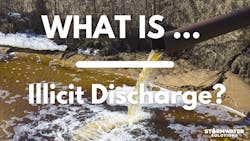What is an illicit discharge?
An illicit discharge is any discharge to a municipal storm sewer system (storm drains, pipes and ditches) that is not composed entirely of stormwater. These discharges can occur in several ways including companies or residences with waste pipes tapped into stormwater pipes or individual use of storm drain inlets to dispose of waste. According to the New York Department of Transportation (DOT), anything other than stormwater in storm sewers is illegal.
In municipal separate storm sewer systems (MS4s), storm sewers transport rain water directly to surrounding water bodies without being treated. In an MS4, stormwater does not get carried to wastewater treatment facilities.
What are examples of an illicit discharge?
Examples of illicit discharges include:
- Septic tank seepage
- Laundry wastewater
- Dumping of oil or other auto fluids
- Dumping of concrete and paints
- Pesticides and fertilizers
- Improper disposal of hazardous waste
- Pool or spa discharges
- Cooking grease
There are a variety of methods to properly dispose of the above without an illicit discharge. Disposal of auto fluids, paints and other chemicals can be handled in an approved manner such as a dedicated waste facility. Disposing of anything other than stormwater down a storm drain is considered an illicit discharge.
What are signs of an illicit discharge?
Illicit discharges can be apparent if there is flowing water or fluids in a storm system when there has been no recent rainfall. This is even more apparent during a dry spell.
Other signs include:
- Flowing outfalls during dry period
- Visible sewage waste
- Foul odors
- Suds
- Other evidence of contamination
Exempted non-stormwater discharges
According to the Kansas Department of Health and Environment, there are some allowable non-stormwater discharges including:
- Water line flushing
- Landscape irrigation
- Diverted stream flows
- Rising groundwater
- Uncontaminated groundwater infiltration
- Air conditioning condensation
- Flows from wetlands
- Springs
- Discharges from firefighting activities
It is important to note that the U.S. Environmental Protection Agency regulates MS4s, and when the agency issues the MS4 permit it is giving a community approval to discharge stormwater to surface waters. The permit comes with the understanding that only stormwater will be discharged to the water bodies.
Exemptions and specific rules to discharges outside of the MS4 program may differ.
Why are illicit discharges harmful?
Illicit discharges become harmful when anything other than stormwater enters a water body. Polluted stormwater from illicit discharges can contaminate lakes, rivers, wetlands and other waterways. Specific nutrients like phosphorous and nitrogen can promote algae growth. Toxic fluids from automobiles for example can threaten water quality and kill wildlife. Bacteria from animal waste can impact water quality and make it unsafe for swimming or fishing.
What is an illicit connection?
An illicit connection is any unauthorized pipe, ditch or other structure that is connected to a property or drainage system. Typical pollutants found coming from illicit connections include raw sewage, heavy metals, oil and grease and solids, among others.
Examples of an illicit connection include:
- Wastewater pipe that is connected directly to a storm drain system
- An industrial drain that is connected directly to a storm drain system
- Unidentified piping connected to a storm drain system
How to prevent an illicit discharge
There are several ways to prevent illicit discharges including:
- Proper waste disposal
- Avoid polluted runoff
- Report discharges
Residents and businesses can avoid illicit discharges by avoiding dumping anything down storm drains. It is important to use chemicals and fertilizers sparingly as they could pollute runoff during rain events. Repairing vehicle leaks and disposing of auto fluids properly can help prevent the pollutants from entering waterways.
About the Author
Alex Cossin
Associate Editor
Alex Cossin is the associate editor for Waterworld Magazine, Wastewater Digest and Stormwater Solutions, which compose the Endeavor Business Media Water Group. Cossin graduated from Kent State University in 2018 with a Bachelor of Science in Journalism. Cossin can be reached at [email protected].

